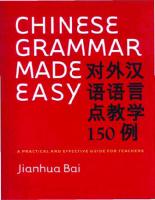Chinese Radicals [PDF]
#1 #2 #3 #4 #5 Radicals Original characters -- -- Pinyin -- -- yan dao ren Meaning -- -- word knife m
44 0 539KB
Papiere empfehlen
![Chinese Radicals [PDF]](https://vdoc.tips/img/200x200/chinese-radicals.jpg)
- Author / Uploaded
- LydiaGeorgieva
Datei wird geladen, bitte warten...
Zitiervorschau
#1
#2
#3
#4
#5
Radicals
Original characters --
--
Pinyin
--
--
yan
dao
ren
Meaning
--
--
word
knife
man
Examples leng cold
jing capital
bing
shuo to talk
di
dao to arrive
qing to request
xiu to stop
jian
emperor
xi to practise
obscure
language
to publish
Immortal
lengyin cold drinks
Beijing Peking
shuo hua to speak
daolai arrival
xiuxi to rest
bingdong to freeze
huangdi emperor
qing wen may I ask...
jianbing handle of a sword
fojing Buddhist scripture
xiguan to get used to
xuanmiao marvellous
yuyan language
yuekan monthly publication
xiannu female immortal
xuan
sword
fo
ice
yu
Buddha
kan
xian
Compounds
#1 The first radical is called the "two drops of water"; it usually appears in characters that have to do with coldness. It's placed at the left side of characters. #2 This radical always stays on top of characters.
#3 This radical is called "speech", and it appears at the left side of characters that have to do with language. #4 The original form of the "knife" is also a radical; it's found at the bottom of characters, as in the first of the following. The second character shows a third form of this radical (placed on top):
fen
to divide
zheng
to argue
#5 The fifth radical is called the "standing person", and is always placed at the left side of characters. The character it comes from can also be used as a radical; in that case it always stays on top, as in the following character:
zhong
crowd
#6
#7
#8
#9
#10
Radicals
Original characters
--
Pinyin
er
shui
xin
guang
--
Meaning
ear
water
heart
broad
--
yang Examples
sun
jiu spirit
xian limit
guai strange
you oil
miao temple
hui to regret
gong palace
chuang bed
ke guest
dui
Compounds
sha
kuai
ting
bao
team
sand
quick
court
treasure
taiyang sun
baijiu white spirit
qiguai strange
simiao temple
huanggong imperial palace
xiandu limit
youhua oil painting
huihen to regret
chuangdan sheet
keqi polite
duizhang team leader
dousha bean paste
kuaile happy
jiating family
lingbao Nouminous Treasure
#6 The first radical is called the "ear", and it can stay at the left side or at the right side of characters. #7 This radical is called "three drops of water", symbolizes flowing water and occurs on the left of characters. Its original form is also a radical; in the following character is placed at the bottom but its position is not fixed:
quan
spring, fountain
#8 The original form of the "heart" is also radical, and is always placed at the bottom, as in the following character:
si
thought
#10 This radical is called "the covering top" and it always occurs on top. Characters with this radical are often related to the idea of house.
#11
Radicals
#12
#13
#14
#15
Original characters
--
Pinyin
men
zou
tu
--
da
Meaning
door
to walk
soil
--
big
jian space in between Examples
jin to enter
wen to ask
yuan far
xian
Compounds
di earth
cao grass
ta pagoda
mi
hua flower
qiang
tai greatest
kua to exaggerate
ping
mei
leisure
to be lost
wall
apple
beautiful
shijian time
jinbu to improve
difang place
caoshu grass writing, cursive
taitai madame
wenti question
yuanzu excursion
dengta lighthouse
xuehua snowflakes
kuakou to boast
xianhua gossip
mixin superstition
qiangbi wall
pingguo apple
meili pretty
#12 The original form of this radical is also a radical, as in the following character:
chao
to exceed
#13 The original form of the "soil" is also radical, and is always placed at the bottom, as in the following characters:
chen
dust
zuo
to sit
#16
#17
#18
#19
#20
Radicals
Original characters
--
--
Pinyin
shou
kou
--
shan
--
Meaning
hand
mouth
--
mountain
--
da to hit Examples
jiao to shout, to call
zhua to seize
ting
dao
hang
island
line
drawing
ling mountain ridge
very
tan to sigh
ti
Compounds
guo country
tu
hen
to carry
to listen
quan circle, to enclose
peak
feng virtue
de
dakai open
jiaohan to shout
guoji international
daoyu islands
yinhang bank
zhuazhu to catch
tanci exclamation
ditu map
shanling mountain ridge
hen duo very much
tigao to raise
tingzhong audience, listeners
quanzi circle, ring
shanfeng mountain peak
daode ethics
#16 The original form of the "hand" is also a radical, placed at the bottom or on the left:
na
to hold, to take
bai
to worship, to respect
#17 The "mouth" is not always placed on the left of characters, as in the following examples:
ming
name
shi
history
#19 This radical also stays on top or at the bottom of characters:
sui
year
yue
high mountain









